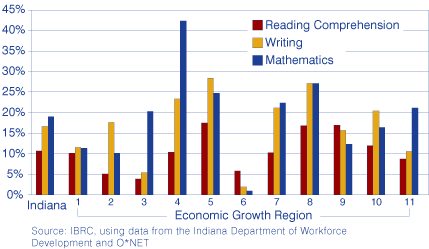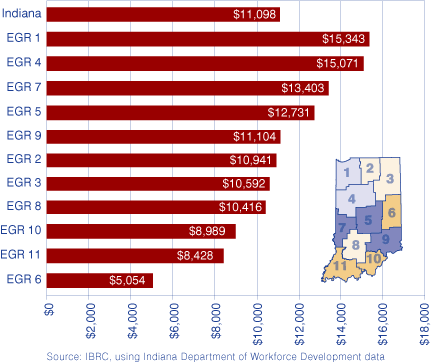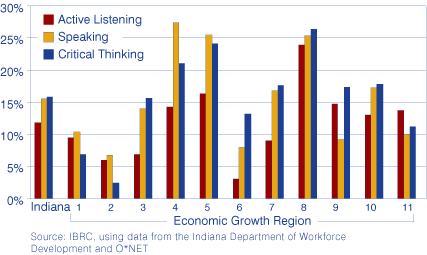Moving “Up One Level:” Improving Job Prospects by Developing Basic Skills
The motto “learn more, earn more” is hardly a cliché—it's a fact. Indiana's regional “up one level” reports (1) highlight the importance of developing basic skills to move from "frequently listed jobs" to better-paying careers in high-demand fields. Analysis of all 255 job transitions listed in these reports shows that moving “up one level” leads to an average wage increase from $21,931 per year to $33,029 per year across Indiana's economic growth regions, but not without an average increase of 10 percent or more in required levels of key basic skills. While this salary increase may appear modest, these job transitions are important first steps up the career ladder that do not require extensive formal training.
This article explores the increases in six basic skill levels for workers to successfully make these job transitions. Next month, we will continue this two-part series by focusing on improvements expected for key cross-functional skills.
This research analyzes the occupations in the “up one level” reports with O*NET skill level scores (2) to measure the extent to which workers in widely available low-wage jobs may need to improve their basic skills to successfully move to higher-paying occupations. The Indiana Department of Workforce Development (IDWD) examined the frequently listed jobs for all 11 economic growth regions and determined “up one level” job transitions that Hoosiers could pursue without much additional training or experience. (3) The O*NET database allows us to calculate the changes in skill requirements for each transition through its skill level scores. These scores indicate the required levels (ranging from 1 to 7) for 35 skills in more than 700 occupations. (4) Table 1 portrays the level scale anchors for each skill (visit http://online.onetcenter.org/skills for more information).
Table 1: Description of Skill Levels
| Skill | Lower Level (Score: 2) | Moderate Level (Score: 4) | Higher Level (Score: 6) |
| Reading Comprehension | Reading step-by-step instructions for completing a form | Reading a memo from management describing new personnel policies | Reading a scientific journal article describing surgical procedures |
| Writing | Taking a telephone message | Writing a memo to staff outlining new directives | Writing a novel for publication |
| Mathematics | Count the amount of change to be given to a customer | Calculate the square footage of a new home under construction | Develop a mathematical model to simulate and resolve an engineering problem |
| Active Listening | Taking a customer's order | Answering inquiries regarding credit references | Presiding as judge in a complex legal disagreement |
| Speaking | Greeting tourists and explaining tourist attractions | Interviewing applicants to obtain personal and work history | Arguing a legal case before the supreme court |
| Critical Thinking | Determining whether a subordinate has a good excuse for being late | Evaluating customer complaints and determining appropriate responses | Writing a legal brief challenging a federal law |
Rewards for the ‘Three Rs'
Reading, writing and arithmetic remain critical requirements since the vast majority of “up one level” job transitions require higher proficiency in these key basic skills. Two-thirds of these transitions have higher requirements for reading comprehension and writing, and 75 percent of these transitions expect higher levels in mathematics.
There are many good examples where higher basic skill requirements accompany successful job transitions and relatively few where little or no skill improvement is required. In Region 9, the “up one level” report suggests that landscaping and groundskeeping laborers—who are in high demand but receive relatively low annual wages ($17,680 per year)—can make the transition to become maintenance and repair workers ($32,170 per year). While extensive training or certification may not be necessary for this transition, skill level requirements are 27 percent higher for reading comprehension, 15 percent higher for writing and 39 percent higher for mathematics. In Region 7, telemarketers and door-to-door sales workers ($14,105 per year) can become customer service representatives ($25,355 per year) through moderate on-the-job training. However, skill level requirements for customer service representatives are considerably higher—43 percent in reading comprehension, 31 percent in writing and 29 percent in mathematics.
One of the few “up one level” job transitions that does not require higher levels of these three basic skills is the transition from forklift/industrial truck operator ($21,320 per year) to heavy and tractor-trailer truck driver ($36,406 per year) in Region 3. In such rare cases, there may be external labor market forces specific to these occupations that greatly affect the link between skills and wages.
Comparing regions in Figure 1, we see that the basic skill requirements of “up one level” occupations are substantially higher than frequently listed jobs in all regions. On average, skill level requirements for reading comprehension increased by 11 percent across all regions with a high of 18 percent in Region 5 and a low of 4 percent in Region 3. Increases in writing and mathematics skill requirements across all regions are even higher at 17 percent and 19 percent, respectively. Overall, required skill level increases are highest in Region 8 where moving up one level required a 17 percent increase in reading comprehension, as well as 27 percent increases in both writing and mathematics.
Figure 1: Average “Up One Level” Skill Increases in Reading, Writing and Mathematics

In most cases, increases in skill requirements are accompanied with comparably high salary increases (see Figure 2). The exception is Region 1 where job transitions involving small basic skill increases are still rewarded with high salary increases, possibly due to effects of the nearby Chicago labor market. However, it comes as no surprise that job transitions in Region 6, which expect the smallest increases in basic skills, have the lowest average salary increase of only $5,054—just half of the $11,098 average increase across all regions.
Figure 2: Average “Up One Level” Salary Increases by Economic Growth Region

Listening Actively, Speaking Eloquently and Thinking Critically
Although less discussed, active listening, speaking and critical thinking are other basic skills that are essential for moving “up one level,” especially since they are among the top four skill demands for Indiana's growing occupations through 2014. (5) According to O*NET, active listening involves “listening to what other people are saying and asking questions as appropriate;” speaking involves “talking to others to effectively convey information;” and critical thinking requires “using logic and analysis to identify the strengths and weaknesses of different approaches.” (6) As basic as these skills may sound, many frequently listed jobs require relatively low levels of proficiency for these skills—scores near 3 on a scale from 1 to 7. However, “up one level” occupations typically require moderate skill levels with a score closer to 4. In all, more than 70 percent of all job transitions require higher skill levels in these basic skills.
The “up one level” report for Region 4 provides a good example of a job transition that requires substantially higher skill levels in active listening, speaking and critical thinking. Here, assemblers in factory settings (this occupation has frequent openings for an average salary of $21,840 per year) can make the transition to machinist, which has an average wage of $35,780. While such a move can occur without formal schooling, the minimal skill levels for machinists are 31 percent higher for active listening, 26 percent higher for speaking and 32 percent higher for critical thinking.
Similar to the regional trends associated with reading, writing and arithmetic, Figure 3 shows that transitions to higher paying jobs across all regions are associated with substantially higher skill requirements—12 percent for active listening, 16 percent for speaking and 16 percent for critical thinking. Compared with Figure 2, meeting the higher skill requirements of “up one level” jobs appears to be best rewarded in Regions 4, 5 and 7, which all have average salary increases exceeding $12,000. Again, Region 1 is the surprising exception by having the highest wage increases ($15,343) despite relatively low skill requirements. Skill increases seem least rewarded in Region 8, where, despite expecting very high skill improvements, wage increases for “up one level” jobs average $10,416—less than the $11,098 average across all regions.
Figure 3: Average “Up One Level” Skill Increases in Active Listening, Speaking and Critical Thinking by Economic Growth Region
From Improving Basic Skills to Advancing Your Career
While every job entails a unique mix of skill requirements, higher paying jobs overwhelmingly expect workers to improve competence in basic skills like reading, writing and arithmetic, as well as active listening, speaking and critical thinking. Developing these skills is a crucial first step to building advanced skills needed to move even further up the career ladder. Next month, we will examine the higher skill requirements for key cross-functional skills that are suited for the increased service and supervisory roles of many "up one level" occupations.
Notes
- “Up one level” reports are available for all 11 Economic Growth Regions in the ‘Publications' section of the Indiana Department of Workforce Development website: www.hoosierdata.in.gov/publookup/default.aspx.
- This data is from the O*NET database, a public resource developed by the U.S. Department of Labor, Employment and Training Administration at
www.onetcenter.org/database.html. - Allison Leeuw and Vicki Seegert, “Putting Feet on Research: Applying Skill Pathway Analysis to Workforce Development,” InContext (May 2007): 1-3.
- O*NET determined these required skill levels through surveys of incumbent workers and occupational experts.
- Michael F. Thompson, “The Demand for Soft Skills: Key Skills for Indiana's Growing Occupations through 2014” InContext (September 2007): 1-2.
- More information on these skills is available on the O*NET website: www.onetcenter.org.
Michael F. Thompson,
Economic Research Analyst
Indiana Business Research Center, Kelley School of Business, Indiana University

